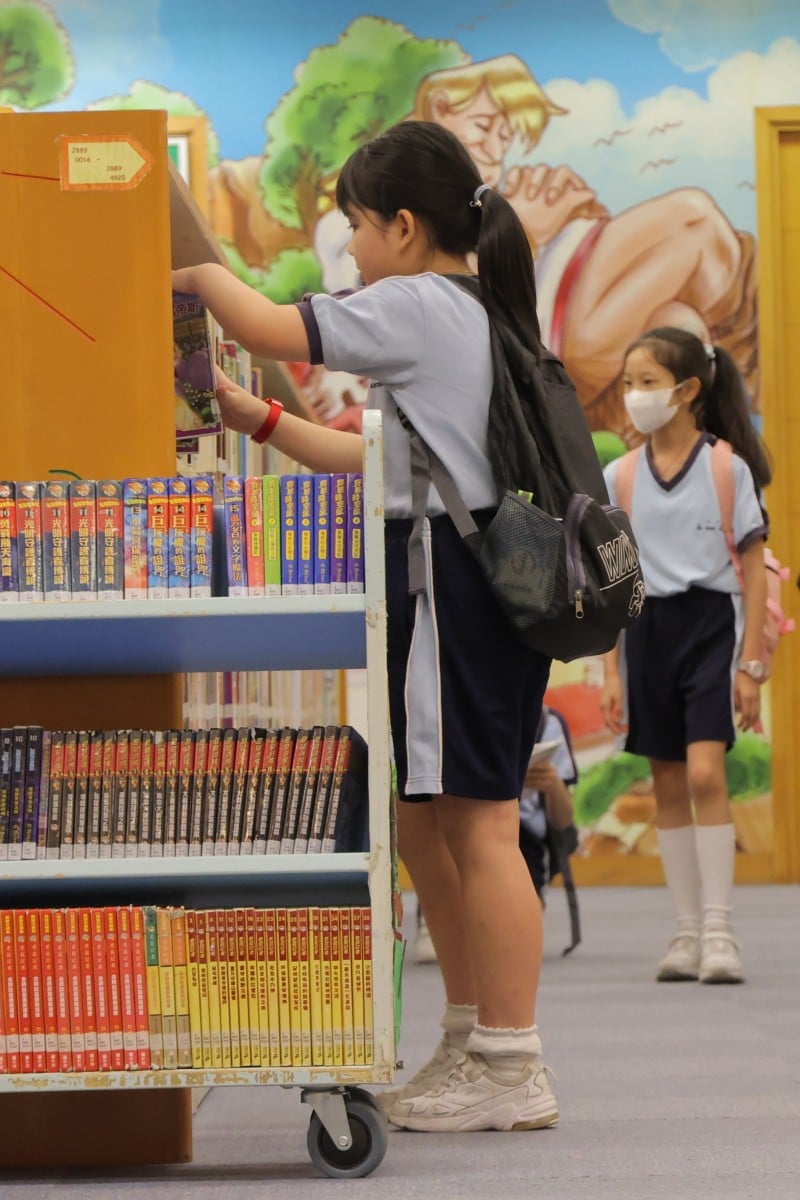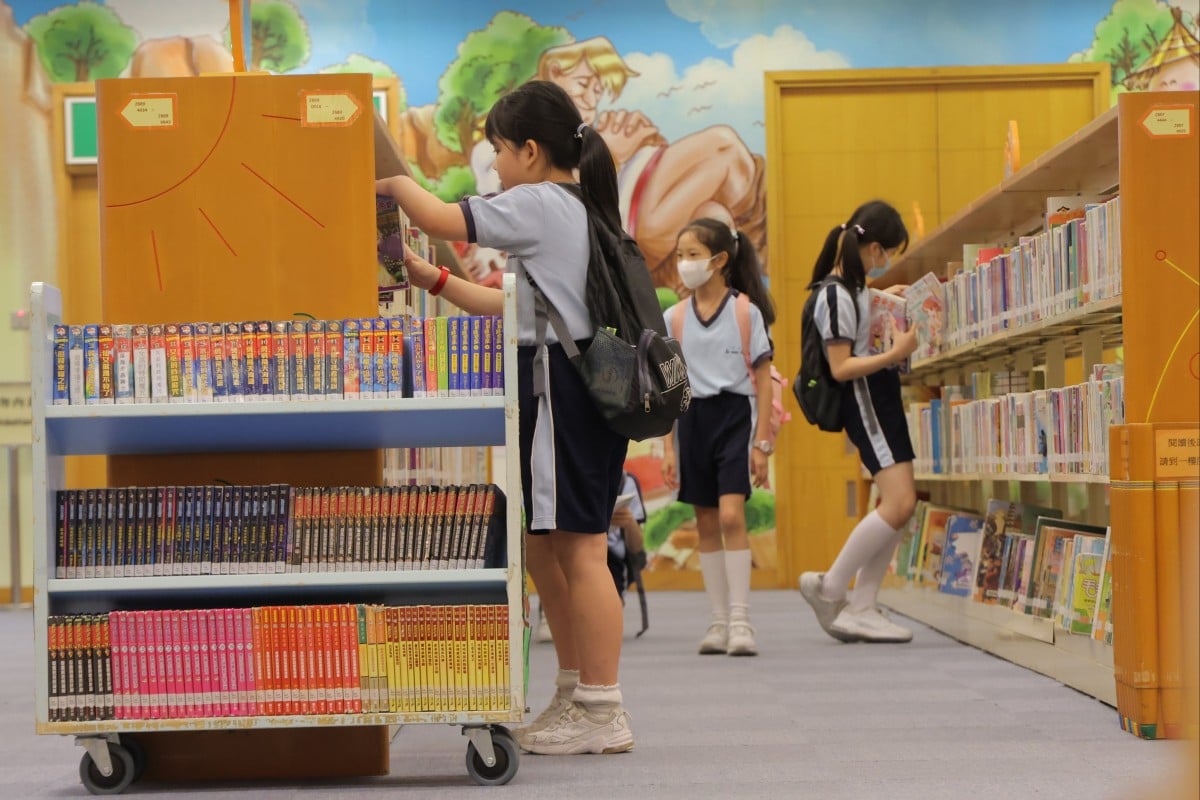
- Students share their reactions to public libraries pulling controversial titles from shelves, as librarian discusses how schools are responding
- Education Bureau says schools do not need to submit library catalogues for review but they should be ‘gatekeepers’ to stock quality books for pupils
 Since the national security law was imposed in 2020, politically sensitive titles have slowly been pulled from the city’s library shelves. Photo: Jelly Tse
Since the national security law was imposed in 2020, politically sensitive titles have slowly been pulled from the city’s library shelves. Photo: Jelly TseAmber*, 11, is an avid reader who recalls spending long hours in Hong Kong’s public libraries in her primary school years. Every month, she reads at least 10 books.
“I enjoy crime-related books because they allow me to use my logic ... [Reading] also helps me develop my vocabulary and language skills,” said the international school student, adding that she hoped to see more graphic novels at the city’s libraries.
“[Comics are] a good way to introduce reading to students who don’t enjoy reading, as the visual format can make reading less intimidating and more enjoyable, and images can help readers better understand complex ideas or emotions,” the book lover said.
Even though Amber now spends more time reading e-books than visiting the library in person, she still felt alarmed by the recent removal of controversial books from public libraries. Some of those titles have now disappeared from her school’s bookshelves, too.
Hot Topics: Hong Kong libraries clearing shelves of sensitive books
Since the national security law was imposed in 2020, politically sensitive titles have slowly been pulled from the city’s public library shelves. Last month, these efforts were ramped up though authorities have not disclosed a list of titles that libraries cannot display.
The Post reported that many books about Beijing’s 1989 Tiananmen crackdown and Hong Kong’s 2019 social unrest, as well as works by prominent opposition political figures, were among the titles being removed.
Some educators fearful of crossing red lines have also removed certain books from schools, such as George Orwell’s classics, Animal Farm and 1984.
“I don’t think I can find those titles in my school library any more. If I try to borrow them, they show up as ‘unable to be borrowed’,” Amber said. “The books serve the purpose of helping us understand who we were before. It is part of the history that shaped the society now.”
Another secondary school student, surnamed Kwok*, shared Amber’s sentiment, saying the removal of sensitive books “deeply saddened” her.
“I don’t think it’s necessary to remove them as their intention was ... [to] offer more insight and allow readers to give their own thoughts on them,” the 15-year-old said, adding that her school still had “plenty” of Orwell’s books.
Though Kwok said the withdrawal of politically sensitive titles wouldn’t significantly affect her visits to the public library, she still felt this move was not right.
“Now, I feel that I have been denied a range of books simply because of their perceived intention,” she shared.
What books should be allowed in school libraries?
Last month, Hong Kong’s education chief Christine Choi Yuk-lin responded to questions on whether schools should remove certain books to follow the moves of public libraries. She said the government would “not specify which type of books [school libraries] can or cannot have” as long as the titles met students’ learning needs.
In an emailed response to Young Post, the Education Bureau said schools did not need to submit their library catalogues for review but that they should play the role of “gatekeepers” to stock quality books for students that were relevant to teaching guidelines.
But Sidney Lui Chi-kong, president of the Quality Library Network – which supports the development of school libraries – noticed that some anxious educators had been excessive in censoring their schools’ collections.
For example, veteran writer Chip Tsao, who goes by the pen name To Kit, is known for his political commentary. Even though his books could still be found in public libraries, Lui said some schools had already removed them from their shelves.
“Even his early books that talk about his overseas studies in the UK disappeared from [some] school libraries. But I don’t think it’s necessary,” said the consultant for secondary school libraries, who has worked as a school librarian for more than 40 years.
Hong Kong public libraries remove books related to Tiananmen Square crackdown
But Lui believed that the removal of these books might not have a significant impact on every young reader.
“Usually, students don’t ... enjoy reading adult books. Teens are more interested in online stories or light reading,” he said.
Still, the educator recognised that school libraries had a special role in helping students develop.
“Certain questions should be discussed at school under the guidance of teachers, and students need to acquire independent thinking,” Lui stressed.
“A school library is a place for students to grow ... and acquire the ability to decide what to believe instead of us erasing the information.”
Why libraries are crucial for the next generation
As a devoted library visitor since childhood, Chinese teacher Sung Chor-on fondly recalled how reading Chinese linguistic books laid the foundation for his career.
The 41-year-old stressed that libraries should stay neutral and offer resources for student learning.
“When students fail to understand certain information about our society and history, it would affect their whole person development,” said the educator who has taught Chinese at local schools for 15 years.
Since the government has not provided a list of what books have been removed from public libraries, Sung has embarked on a mission to keep a record of these titles since May.
Four years ago, he established a Facebook page, called Teacher Sung’s Books and Archives, to share his thoughts on books that caught his attention.
Now, he has used it to collect responses from people about titles they could no longer find in public libraries. His list has now recorded more than 300 titles – though they have not been verified.
“It is crucial for a library to have a comprehensive collection of books, no matter if it’s for leisure reading or academic purposes,” he said.
The Leisure and Cultural Service Department, which manages the city’s 71 public libraries, told Young Post that libraries reviewed and withdrew books when needed. It explained that librarians selected material that “would not spread undesirable notions, violate the laws of Hong Kong or endanger national security”.
Regarding the removal of public library books, Chief Executive John Lee said last month that material circulated had to “serve the interest” of society without breaching the law. The city leader also stressed that such books could still be bought at private bookstores.
Hot Topics: Hong Kong’s new subject to foster patriotism in junior forms
But veteran journalist Allan Au said he did not think it was sufficient to only provide these titles in private bookstores and highlighted the role of public libraries.
“Not everyone has access to university libraries or has the money to purchase the publications,” the 54-year-old said. “The library is a platform to bridge knowledge and achieve intellectual equality.”
Au’s book on media censorship, Freedom under 20 Shades of Shadow, was found unavailable in public libraries in 2021. In May, his remaining two titles about travel were also removed from public library shelves. However, his books are still available in the libraries of some of the city’s universities.
8 books that have been banned or challenged around the world
“The two ... travelogues about learning and understanding the world match with the public library service,” the author argued, adding that libraries also served an important role in teaching the next generation.
“Our education should not be narrowed to the school syllabus,” he emphasised.
“Knowledge is boundless. We should not limit the school’s library books to only be related to the curriculum, but it should have more things to help students understand the world.”
“Like it or not ... [books] are the record of history.”
*Full names withheld at interviewee’s request.
Avid 熱衷的
showing great enthusiasm for or interest in
Ramped up 加快速度
an increase in amount, intensity, extent
Crackdown 鎮壓
the severe or stern enforcement of regulations
Prominent 著名的
leading, important, or well-known
Gatekeeper 看守者
a person or thing that controls access, as to information
Veteran 經驗豐富的
a person who has had long service or experience in an occupation
Intellectual 智力的
of or relating to the intellect
Travelogues 遊記
book about travelling to or in a particular place
